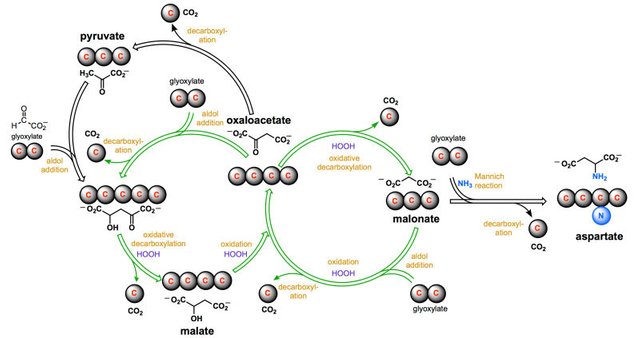Life Could Have Evolved From These Ancient Chemical Reactions

From Gizmodo
Fundamentally, your body is just a crazy chemistry experiment. You put in food and oxygen, chemical reactions happen, and out comes energy and poop. But how did these reactions first begin? Some scientists think they have an idea.Read more: https://gizmodo.com/life-could-have-evolved-from-these-ancient-chemical-rea-1821884515You might remember learning about cellular respiration, the process by which your body turns sugar into energy and carbon dioxide in the mitochondria. Some parts of the body’s functioning, like the citric acid cycle (aka Krebs cycle), are highly evolved and difficult to study. But a team of researchers, including a pair of undergraduates, has found an analog of the citric acid cycle, one that could have existed before life on Earth and that present-day chemical reactions evolved from.
“It’s akin to looking at a modern roadway like Route 66,” explained Greg Springsteen, a chemistry professor at Furman University in South Carolina. “Wagon trails were templates for Route 66. The twists and turns of the modern pathways tell us about the challenges of the original route.”
The citric acid cycle—which, again, is part of how all oxygen-using life on Earth generates energy—takes a chemical called pyruvate through a series of reactions, adding and removing molecules to change its form, produce energy, and charge or produce other molecules to use in other reactions. That’s all done with the help of specially evolved enzymes, which make the reactions happen more efficiently. Because this cycle relies on these advanced enzymes, it’s hard for scientists to figure out how the cycle originated. What chemicals could have sparked the process before those enzymes evolved?
But the team of scientists from Furman University (including undergraduates Julia Nelson and Chandler Joel Rhea) and the Scripps Research Institute in California found two chemical reactions in a lab setup that mimicked early Earth conditions that look like pre-life versions of the citric acid cycle, called the “HKG” and the “malonate” cycles.
I'm not going to pretend I understand most of this but what I did learn was fascinating. I really hope that we discover the source of life on our planet within my limited lifespan. Better yet I'd love it to be paired with discovery of alien life too.
Leave your thoughts in the comments below.
Follow @contentjunkie to stay up to date on more great posts like this one.





You assume aliens will be friendly? Not sure that can be supported. The opposite seems equally likely
Either way it would be an awe inspiring event.
I think the theory is that by the time a species develops interstellar travel that they'd be able to work together on a global scale. That scale would require cooperation and diplomacy which would likely translate into a general peacefulness towards other (likely lesser) species.
Another way to think of it: Would we go out of our way to make war on bonobos?
We will happily drive a native species from it's habitat if there are resources for us to exploit though.
There are resources a plenty in space. Why waste energy coming down to a gravity well to extract something you can get from an asteroid or comet?
Alien can't be friendly so i wouldn't support the idea but then a positive part could be supported.
"Alien can't be friendly"
How do you know that?
Some friendly suggestions, from someone who's been there - keep your quotes as SHORT as possible, even if you need to paraphrase what's being said, rather than directly quoting. By some reckonings, you can get dinged if your original commentary isn't MORE than 50% of the post.
Quote from and/or link to MORE than one article, even if you have to change the subject a little.